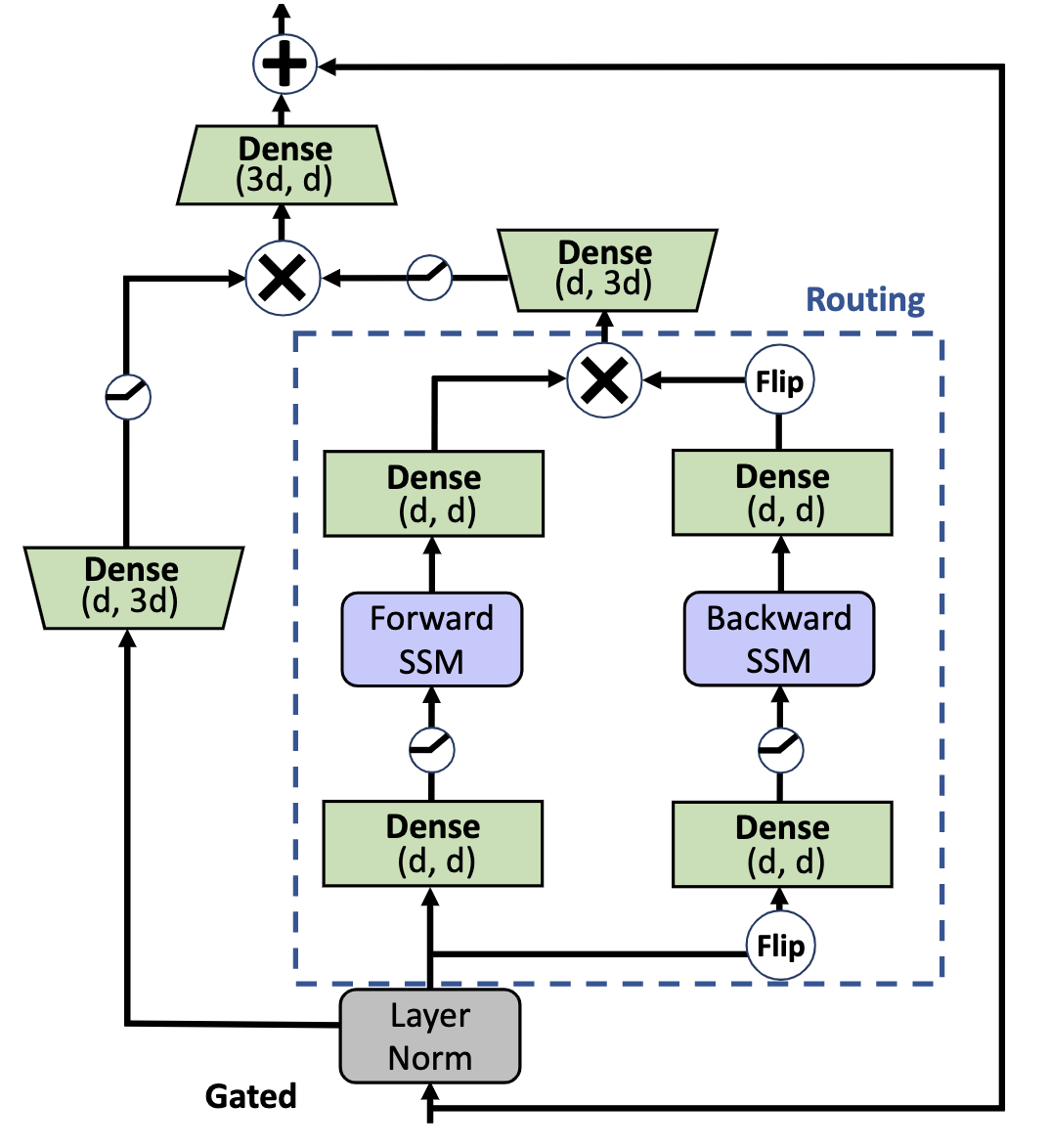---
license: apache-2.0
datasets:
- wikipedia
- bookcorpus
language:
- en
---
## Pretraining Without Attention(BiGS)
## Official JAX Models with maximal sequence length 512
### [Paper](https://arxiv.org/abs/2212.10544) | [](https://huggingface.co/JunxiongWang) | [](https://colab.research.google.com/drive/1Fz3OSRF3PZEF_dlnyJ3KZ8Bq35DfUrIB?usp=sharing)
 This [repository](https://github.com/jxiw/BiGS) contains BiGS's jax model definitions, pretrained models weights, training and fintuning code for our paper exploring using state space models for pretraining. You can find more details in our paper.
[**Pretraining Without Attention**](https://arxiv.org/abs/2212.10544)
This [repository](https://github.com/jxiw/BiGS) contains BiGS's jax model definitions, pretrained models weights, training and fintuning code for our paper exploring using state space models for pretraining. You can find more details in our paper.
[**Pretraining Without Attention**](https://arxiv.org/abs/2212.10544)
[Junxiong Wang](), [Jing Nathan Yan](), [Albert Gu](), [Alexander M.Rush]()
Cornell University, Cornell Tech, DeepMind
Transformers have been essential to pretraining success in NLP. While other architectures have been used, downstream accuracy is either significantly worse, or requires attention layers to match standard benchmarks such as GLUE. This work explores pretraining without attention by using recent advances in sequence routing based on state-space models (SSMs). Our proposed model, Bidirectional Gated SSM (BiGS), combines SSM layers with a multiplicative gating architecture that has been effective in simplified sequence modeling architectures. The model learns static layers that do not consider pair-wise interactions. Even so, BiGS is able to match BERT pretraining accuracy on GLUE and can be extended to long-form pretraining of 4096 tokens without approximation. Analysis shows that while the models have similar accuracy, the approach has significantly different inductive biases than BERT in terms of interactions and syntactic representations.
### Load Masked Language Model
```python
import jax
from jax import numpy as jnp
from transformers import BertTokenizer
from BiGS.modeling_flax_bigs import FlaxBiGSForMaskedLM
tokenizer = BertTokenizer.from_pretrained('bert-large-uncased')
model = FlaxBiGSForMaskedLM.from_pretrained('JunxiongWang/BiGS_512')
text = "The goal of life is [MASK]."
encoded_input = tokenizer(text, return_tensors='np', padding='max_length', max_length=512)
output = model(**encoded_input)
tokenizer.convert_ids_to_tokens(jnp.flip(jnp.argsort(jax.nn.softmax(output.logits[encoded_input['input_ids']==103]))[0])[:10])
# output: ['happiness', 'love', 'peace', 'perfection', 'life', 'enlightenment', 'god', 'survival', 'freedom', 'good']
jnp.flip(jnp.sort(jax.nn.softmax(output.logits[encoded_input['input_ids']==103]))[0])[:10]
# probability: [0.16052087, 0.04306792, 0.03651363, 0.03468223, 0.02927081, 0.02549769, 0.02385132, 0.02261189, 0.01672831, 0.01619471]
text = "Paris is the [MASK] of France."
encoded_input = tokenizer(text, return_tensors='np', padding='max_length', max_length=512)
output = model(**encoded_input)
tokenizer.convert_ids_to_tokens(jnp.flip(jnp.argsort(jax.nn.softmax(output.logits[encoded_input['input_ids']==103]))[0])[:10])
# output: ['capital', 'centre', 'center', 'city', 'capitol', 'prefecture', 'headquarters', 'president', 'metropolis', 'heart']
jnp.flip(jnp.sort(jax.nn.softmax(output.logits[encoded_input['input_ids']==103]))[0])[:10]
# probability: [0.9981787 , 0.00034076, 0.00026992, 0.00026926, 0.00017787, 0.00004816, 0.00004256, 0.00003716, 0.00003634, 0.00002893]
```
### Load Sequence Classification Model
```python
from BiGS.modeling_flax_bigs import FlaxBiGSForSequenceClassification
model = FlaxBiGSForSequenceClassification.from_pretrained('JunxiongWang/BiGS_512')
```
### Load Question Answering Model
```python
from BiGS.modeling_flax_bigs import FlaxBiGSForQuestionAnswering
model = FlaxBiGSForQuestionAnswering.from_pretrained('JunxiongWang/BiGS_512')
```
### Load Multiple Choice Classification Model
```python
from BiGS.modeling_flax_bigs import FlaxBiGSForMultipleChoice
model = FlaxBiGSForMultipleChoice.from_pretrained('JunxiongWang/BiGS_512')
```
### GLUE Experiments
GLUE is made up of a total of 9 different tasks. You can use this python [script](https://github.com/jxiw/BiGS/blob/main/run_glue2.py) to run GLUE tasks.
We finetune BiGS on TPU-v3 with 8 cores. Since the batch size per device is 2, the total number of batch size is 16.
```
export TASK_NAME=cola
python run_glue2.py \
--model_name_or_path JunxiongWang/BiGS_512 \
--task_name $TASK_NAME \
--max_seq_length 512 \
--learning_rate 2e-5 \
--num_train_epochs 3 \
--per_device_train_batch_size 2 \
--logging_steps 100 \
--eval_steps 500 \
--weight_decay 0.01 \
--output_dir BiGS_$TASK_NAME/
```
Those give us the following result
| Task | Metric | Result |
|-------|------------------------------|-------------|
| CoLA | Matthews corr | 67.9 |
| SST-2 | Accuracy | 93.8 |
| QQP | Accuracy/F1 | 91.4/88.4 |
| MNLI | Matched acc./Mismatched acc. | 86.2 |
| QNLI | Accuracy | 91.6 |
| MRPC | F1/Accuracy | 86.4/80.4 |
| STS-B | Pearson/Spearman corr. | 89.1/89.0 |
| RTE | Accuracy | 73.3 |
If you use our models, please cite the following papers.
```
@article{wang2022pretraining,
title={Pretraining Without Attention},
author={Wang, Junxiong and Yan, Jing Nathan and Gu, Albert and Rush, Alexander M},
journal={arXiv preprint arXiv:2212.10544},
year={2022}
}
``` This [repository](https://github.com/jxiw/BiGS) contains BiGS's jax model definitions, pretrained models weights, training and fintuning code for our paper exploring using state space models for pretraining. You can find more details in our paper.
[**Pretraining Without Attention**](https://arxiv.org/abs/2212.10544)
This [repository](https://github.com/jxiw/BiGS) contains BiGS's jax model definitions, pretrained models weights, training and fintuning code for our paper exploring using state space models for pretraining. You can find more details in our paper.
[**Pretraining Without Attention**](https://arxiv.org/abs/2212.10544)